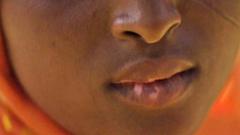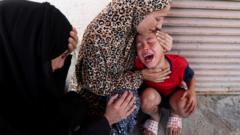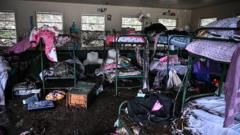In a poignant account, a Nigerian mother, Fatima, shares her heartbreaking experience of using skin-whitening creams on her six children, driven by societal pressures and the desire for acceptance. The aftermath has resulted in serious skin damage, discrimination, and regret. This story sheds light on the alarming prevalence of skin-lightening practices in Nigeria, the cultural implications, and the urgent need for public health interventions.
The Hidden Dangers of Skin-Lightening Products: A Nigerian Mother's Regret

The Hidden Dangers of Skin-Lightening Products: A Nigerian Mother's Regret
A mother's use of harmful skin-lightening creams on her children in Nigeria has led to devastating consequences, highlighting the urgent need for awareness and regulation.
A mother in northern Nigeria, identified as Fatima, is grappling with the tragic impact of skin-lightening creams on her six children. The 32-year-old expresses her distress as she holds her two-year-old son, who bears the visible effects of burns and discolored skin caused by these harmful products, which she used under familial pressure. Fatima recalls her deepest regret as her daughters experience heartbreaking consequences, one hiding her scarred face while others suffer from skin discoloration and wounds.
Fatima explains that her decision to use skin-whitening products stemmed from her own experiences of familial bias based on skin tone, leading her to feel less valued compared to her light-skinned relatives. The creams she purchased from local markets contained dangerous ingredients like hydroquinone and corticosteroids, which pose severe health risks when used improperly. Initially, she thought the creams would help her children gain acceptance, but the consquences tell a different story.
Skin-lightening, prevalent among women in Nigeria where up to 77% engage in this practice, reflects significant cultural pressure and beauty standards that equate lighter skin with attractiveness. Experts warn that these harmful practices lead to dermatological issues, including mercury poisoning and kidney damage. Despite regulatory efforts, including a state of emergency declared by Nigeria’s National Agency for Food and Drug Administration and Control (Nafdac), the dangerous culture of "bleaching" persists.
Zainab Bashir Yau, a dermatology spa owner, reveals that many women resort to bleaching their children as a way to shield them from society's biases. The stark reality of this practice is showcased by the experiences of Fatima’s daughters, who face societal discrimination and stigma, often being mistaken for drug addicts due to their darker knuckles contrasting with their lighter skin.
During a visit to a bustling market in Kano, it became evident how ingrained this practice is, with various vendors selling skin-whitening creams and mixing harmful substances on demand. Many customers, including mothers seeking creams for their children, remain unaware of the dangers associated with these products, often driven by a desire to achieve perceived beauty ideals.
Fatima's distress is compounded by the recognition of the lifelong impact her decision has had on her children's lives. Despite efforts by health officials to curb the sale of these creams and educate the public on their dangers, many are still entangled in harmful beauty practices.
Fatima hopes that her story can serve as a cautionary tale for other parents facing similar pressures. She highlights the importance of rejecting harmful beauty ideals and encourages open conversations about the dangers of skin-lightening products, urging others to avoid making the mistakes she did.


















